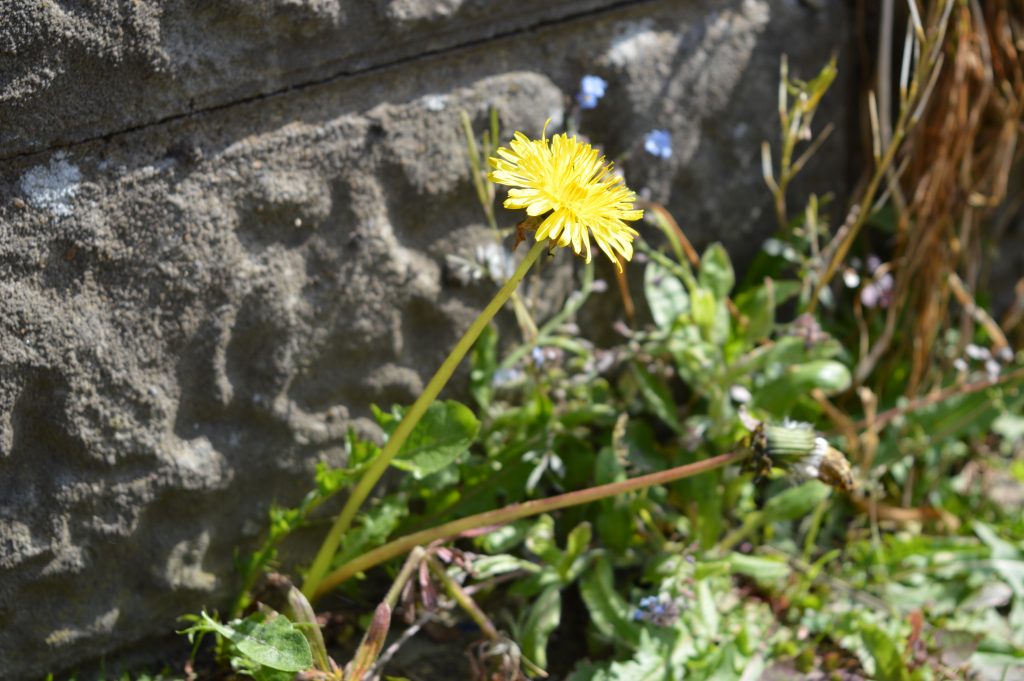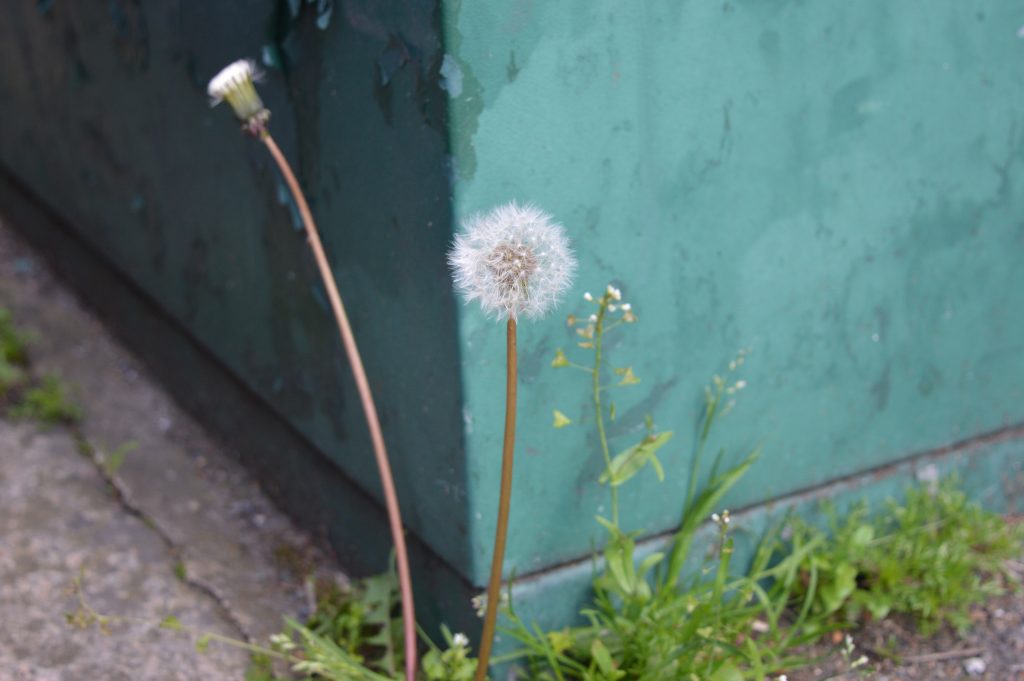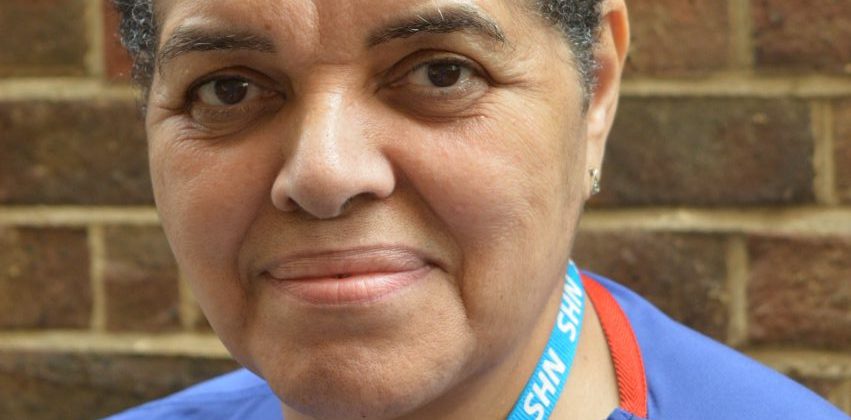People – The life behind the uniform. NHS is its people and everyone has their own life story and unique reason for joining.
NHS is full of staff. Many of them well-meaning, some hardworking and a few with skills of the kind that only comes with experience from life.
Those you get from having been there, fought and gone through. Qualities that can’t easily be assessed or measured. That won’t lend themselves to sessions called interviews that really just are about key words, lingo and jargon; good at hiding substantial and intellectual poverty, useless in explaining, showing and revealing… Who you are. I love doing my nursing alongside these people, simply because they are, in the fullest sense, bloody good workers. NHS’s most valuable asset.
Welcome to Trudy and her story.

I’m Trudy and I was born in Ramsgate general hospital, a little seaside town in Kent which is very nice in the summer but horrible in the winter.
Around seven or eight, I figured that all the children in my house were different; there was one like me, mixed race, there was
It turned out I was adopted by an English couple, having had an Irish mother and a black American father.
For as long as I can remember I’ve liked music. There wasn’t really any music in my home apart from when we had the chance to tune the radio to what we wanted; we used to play it as an escapism… It was whatever music of the day. Me and two of the siblings were involved in the Salvation army; they had something called the singing company where you played various instruments and I played the tambourine. We liked it there.

Our upbringing… Had it been today; people would definitely have gone to prison. It was the most awful life… They were very bad parents… And I think that’s why we, us siblings, still are so close. Do I want to talk about what happened there? No, it’s really too deep… I don’t want to go into it…
School was ok. Kind of had a few problems…. Always wanted to feel… Like in the crowd, you know? So sometimes I did non-appropriate things to get people to talk about me… Like; “Trudy did this, Trudy did that.” Racism didn’t feel like a big issue. It was the odd name-calling, but it wasn’t a huge thing.
When I was seventeen, I took the first chance I had to get out of there; my sibling had moved to Croydon and already had both a husband and a house and they let me rent a room until I sorted things out. Now for the first time, I saw lots of people about that looked like me; I felt like I fitted in. I felt like it was a really good move.
I got a job at Allders, which used to be a big department store. A girl there said that she lived in a house with vacant rooms so… I moved in; she was upstairs, me downstairs and we became very good friends. We lived there for two or three years, went to parties together and she invited me over to her parents.
I met a man in a pub at Thornton heath. I was about nineteen. He was from Africa and people around were assuming, or presuming, that he only really wanted to get married for the sake of having a status in this country… But I didn’t feel I had to prove they were wrong… Or right… I didn’t feel I had to prove anything really. But people close to us, his family and my family they didn’t really… They didn’t think it was real, let’s say. Well, we got married anyway and got our first child. To be a mum came naturally to me; I liked it.

A family friend said that they were recruiting what was then called auxiliary nurses at Queens hospital. I just went along and had an interview and that was it really; I joined the Health Service 1982. The hospital is demolished now, unfortunately.
How it worked then was that you start the job and went for the training maybe a month or so later. You more or less learned as you went along, you know. It was an elderly care ward in what was called a long-stay hospital. It became the patients’ home. When I’d been there for so many months, the nursing officer said that I got outstanding leave to take and I said “Oh no, it’s ok; I don’t really want to take the leave.” That’s how much I liked it.
Maybe it was the caring aspect… Everyday there was something different going on and it was very interesting. Most of my nursing career has been with the elderly. Back then you just took care of them, like it was in their home. Now, on an elderly ward; everyone one is there for a reason, for an investigation…There’s so much more going on in the elderly care today. Then, they were there for a very long time; most of them ended their days there.
I remember a little Anglo-Indian lady, always dressed in a blouse, a cardigan and a long skirt down to the ground. She had very bad legs from rickets and was only happy when her sister came, which was every afternoon. But apart from that she would, despite her legs, just walk and walk up and down the ward, non-stop. Then the sister would come and have her favourite chocolate and she would be happy for a while until the sister left and she would start walking again… The next day the sister would come for another visit… And that’s how it went by, day after day, year after year.
Things were relaxed; it was never “Oh, matron is coming.” Sometimes higher people would come, but they would always start with a conversation; like “how are you girls doing?” And sometimes they came only for that; to talk. It was very relaxed. There were many Irish nurses and some Jamaican and African. It was a really nice bunch of people.
There were not many doctors about. A consultant came once week, normally on a Monday. I used to think that he was very… You know, have lots of authority and that… Once, when I was coming into the hospital ground for a night shift, someone suddenly attacked me and tried to snatch my bag and as out of nowhere that consultant appeared and came to my aid. He made sure I was ok, took me into his office, called the police… You know, I used to think; oh, he’s the doctor, but he really was a very nice man!
People used to survive on very little sleep.
I was working nights, my husband worked days and I did the school run. Say I worked Wednesday to Saturday; Wednesday there was no sleep ‘cause I went to work in the night; Thursday and Friday; you worked the night, got home in the morning, took my son to school, slept for three-four hours, got up, went to school… Saturday was ok, because my husband was at home. That’s how it was; most night staff lived like that. People used to survive on very little sleep. I was doing full time nights for about thirty years. It was tough, but if you know it’s something you have to do; you just get by, you know? I was fortunate because I only had one child at that time; some people had two or three. Did I sleep at work? No no, we never slept at work!

First we rented a flat from the local authority, then we managed to buy that on the right to buy scheme. There was only one gas heater in the front room and the minute you turned it off, that was it; the heat was gone! Then we managed to buy a house instead. I was proud and happy. It was hard work but we could see that good came out of it.
I got pregnant and all along the midwife kept saying; “she’s very tall, she’s going to be very tall.” I’m tall and my husband is quite tall so I didn’t really think anything of it. My daughter was born and we stayed only one night in hospital, but before we left the paediatrician came and said that they wanted somebody to come and see her and then a geneticist came and then it all happened quite fast. Within a year we had a diagnose and numerous appointments at St George’s and it all kind of took off.
She had something called Marfan syndrome. Children with it grow to be very tall, they have long limbs and they can have problems with different things; the roof of their mouths, their eyes and they can have congenital heart defects… We started going to the Brompton hospital because they knew quite a bit about this illness.
She’d had an artificial valve put into her heart, she was on warfarin and had her bloods taken first weekly, then every two weeks and all in all it was ok, you know. There were no problems.
She was completely normal mentally. One afternoon, at the physio therapy department, I didn’t quite like the way the physio therapist was talking to her. So I said “Excuse me, I really have no wish to be rude, but you’re talking to her like she doesn’t understand you, but there’s nothing wrong with her mentally!”. After that we didn’t go back. She had her boots and special supportive ankle shields and she managed fine.
When she was nine she had major open heart surgery at the Brompton. They said the operation was a success, but they couldn’t say… They didn’t know how long she would… They mentioned ten, maybe fifteen years.
So, we relaxed. Operation was done and over with, she didn’t go to school for about three months, but the local authority provided her with home schooling and then she went back to school and everything was good. Everything was going good.
One Sunday morning she said “I don’t feel very well.”
One Sunday morning she said “I don’t feel very well.” My husband was at work so I called the out of hours and a doctor came and saw her and said “we’ll take her to the hospital.” And… Within twenty-four hours she was gone.
It was a complete shock… You know… You kind of put those ten-fifteen years in the back of your mind… And then…
…
… And you think that you’ll never, ever, get over it. You think that the way you feel that day is how you’ll feel for the rest of your life.

Someone said to me; “It’s difficult now… We know it’s difficult, but, there’s a saying that you’ll never be given more than you can deal with.” And I said that “I’m not buying that… Right now… I’m not buying that!”
But… I think that it’s some truth in it, you know. Because somehow you just pick yourself up and keep on going. The people that I worked with was just amazing! Really and truly; just so amazing! Their help was huge. I can think of maybe… Maybe five colleagues that… I don’t think I would have gone through it without them.
Immediately after the funeral it was like; What are we going to do? We had sourced this place where we were going to have some kind of wake or whatever and I hadn’t even figured what… Who’s going to put the food and… And the five colleagues said; “We’ve taken care of all that, you don’t need to worry about any of that!” And within half a day they had done everything! I really couldn’t believe… They were absolutely amazing!
It’s like, in some ways, those colleagues that you’ve worked with for many, many years, they become your family, you know. You could tell them anything, share anything with them… You know that they would be there for you, just as you would be there for them. It was just amazing.
People say to me that “Oh, you never went on and you should have done this and you should have done that.” But, you know, with the circumstances, it wasn’t possible. I couldn’t have done… Or maybe I could have? A very good friend of mine said that “you could have done it, you could have done your (nurse) training!” There would have been plenty of people that would have helped you!” But right then, my daughter was my priority. Sometimes I think; “Oh, maybe I should have… Did I really try hard enough?” But right there and then, it didn’t really enter my mind.
Somehow you just pick yourself up and keep on going.
How has the NHS changed? The staff has changed; The comradery is not what is used to be, I don’t think… Maybe people’s lives are busier now? But back then; we had it tough as well, you know! I think staff now are a lot younger than what we were. When I first joined, there were quite a lot of middle aged ladies… But now; I look at the nurses and they are young! They haven’t yet got married, they haven’t yet got children. They are always talking about “Oh, I went there and I went there and I’m going there!” They are busy! They really enjoying life, which is great for them. I don’t blame them at all; it’s better to do what you want to do before your life takes the next turn.
Have the patients changed? No, but their attitude has. I think… Then, they were so very grateful for what you did for them, you know. Now; it’s kind of like; “Well, this is what I’m supposed to have and this is what I’m gonna get.” Do you see what I mean?

I still feel at home in Croydon. And I still enjoy going back to Ramsgate; I’ve got a sibling there. I go on a Friday and come back on a Monday and we sit and chat… And still it’s beautiful in the summer and horrible in the winter. And I’m still married to the same man I married all those years ago.
I was quite happy with the treatment I received when I was a patient in the NHS. It felt unusual to be on the receiving end, but it was all very professional, very reassuring and I had first class treatment.
I will have a major heart operation soon and I feel confident that it will be ok. I’m not scared. I’m sitting at home by the table reading the correspondence between the three of them; the cardiologist the surgeon and the GP. I sit there, reading about myself, it’s four letters up until now… And it’s quite funny; they write like; “It was a great pleasure to meet this very nice lady…” HAHAHA.




A heartwarming story about a lovely lady well told.
I really enjoyed it!
More please…
I join Lucy in every word she wrote. Israela
Enjoyed reading this story about Trudy (especially these last couples of weeks I have been thinking about her). Lovely lady and a wonderful friend.
(Ps. David managed to read the blog due to inbox emails. Direct link works better for me).
Take care 🙂
What a wonderful and lively portrait you have done David.
Mor